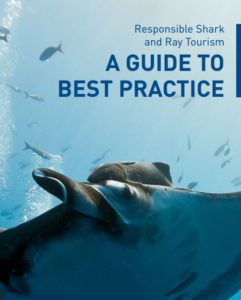
Foghorn (A Call to Action!)
Flotsam (what we’re obsessed with right now)
- This reports on the activities of the WWF is shocking and damning. WWF Funds Guards Who Have Tortured And Killed People.

- I am always here for deep-sea art.
Over 15 years of ocean science and conservation online

Foghorn (A Call to Action!)
Flotsam (what we’re obsessed with right now)

 Shark wildlife tourism* is a growing marine industry with big implications for shark conservation. While there are many competing definitions, generally shark wildlife tourism refers to SCUBA dive operators who offer trips that guarantee that you’ll see sharks, often through the use of bait or chum to attract sharks to the divers. This has become a contentious issue in marine science and conservation circles. That’s why last week’s news that WWF, Project AWARE, and the Manta Trust released the first-ever guide to responsible shark and ray tourism best practices is so welcome. This thorough and well-researched guide guide is designed for dive operators who want to minimize their potential harm to sharks and rays while maximizing the potential conservation benefits of shark wildlife tourism.
Shark wildlife tourism* is a growing marine industry with big implications for shark conservation. While there are many competing definitions, generally shark wildlife tourism refers to SCUBA dive operators who offer trips that guarantee that you’ll see sharks, often through the use of bait or chum to attract sharks to the divers. This has become a contentious issue in marine science and conservation circles. That’s why last week’s news that WWF, Project AWARE, and the Manta Trust released the first-ever guide to responsible shark and ray tourism best practices is so welcome. This thorough and well-researched guide guide is designed for dive operators who want to minimize their potential harm to sharks and rays while maximizing the potential conservation benefits of shark wildlife tourism.
 Ian Campbell has spent his entire career employed across the spectrum of fisheries science and policy, working as a marine surveyor, a fisheries observer and writing fisheries policy for the UK & European governments. He even spent several years as a commercial diver working on oil rigs and for the film industry. Ian is currently leading WWF’s global shark management work. You can follow him on twitter @IanFisheries , and follow the WWF campaign @WWF_sharks.
Ian Campbell has spent his entire career employed across the spectrum of fisheries science and policy, working as a marine surveyor, a fisheries observer and writing fisheries policy for the UK & European governments. He even spent several years as a commercial diver working on oil rigs and for the film industry. Ian is currently leading WWF’s global shark management work. You can follow him on twitter @IanFisheries , and follow the WWF campaign @WWF_sharks.
On September 2, in a back room on the campus of the Secretariat of the Pacific Regional Environment Programme (SPREP), on the small island of Samoa, we at the environment conservation non-government organisation, World Wide Fund for Nature WWF quietly launched our Pacific Shark Heritage Programme. This launch was incorporated into the bigger, much flashier United Nations meeting on Small Island Developing States (SIDS), where the United Nations Secretary General Ban Ki Moon spoke of partnerships, conservation of the oceans’ resources and responsible stewardship. There were meetings of Heads of State & UN officials, the World Bank and Ambassadors, with lots of “high-level statements” and “roadmaps for the future of the oceans” announced at champagne & canapé receptions. Yet, we believe, it was our unheralded meeting in the SPREP’s training centre (tea & coffee were provided), that could have the biggest impact on sharks (and rays, rays need love too) and Pacific Island culture.
There are two major components to WWF’s work in the Pacific. The first is to highlight how intrinsically linked sharks and rays are to the many diverse cultures of the Pacific Island nations. We have documented apocryphal tales, fable and legends that have been passed down from generation to generation over hundreds, if not thousands of years. Tales that have been told in villages and communities ever since people have inhabited these islands. And contained in these stories are some truly remarkable accounts of love, war, marriage advice and even a bit of shark taxonomy. Did you know, for example, that in the Cook Islands, a kindly shark gave Ina, the Fairy Voyager a lift across the ocean to be with her fiancé Tinarau, the God of the Ocean? Ina took with her coconuts to ensure she didn’t die of thirst, but no way of opening them (you always forget something, right?). Ina tried to break the coconut on the shark’s head, which resulted in the hammerhead getting its’ distinctive shape. So there’s a taxonomic question answered. It may be a fable, but it’s still as accurate as some recent Shark Week documentaries. On the beautiful island of Taveuni in Fiji, villagers and school children still speak of Dakuwaqa, the shark god, a ferocious warrior who actually protects the islanders. At the SIDS conference there are carvings and murals of Samoan shark legends everywhere, some selling for up to $40,000 (US). In Pacific Island countries, sharks are everywhere and everyone knows about sharks. At WWF, we know we need to keep this history alive.
Read More “Bigger than just conservation: The WWF Pacific Shark Heritage Program” »
The 90’s were a big decade for the environmental movement. The media landscape was filled with environmentally-themed programming. Major laws in the US and internationally were passed to protect the planet. Formative events galvanized, diversified, and sometimes radicalized the conservation community. And, like many other of our generation, we came of age right in the middle of it.
Here are 25 signs that your laid the foundation for your environmental ethic squarely in the 1990’s. Happy Holidays from Southern Fried Science.
1. Captain Planet taught us that “The Power is Yours!”
You knew this would be on the list, so let’s get it out of the way. Moving on.
Read More “25 signs that you were a conservation child of the 90’s” »